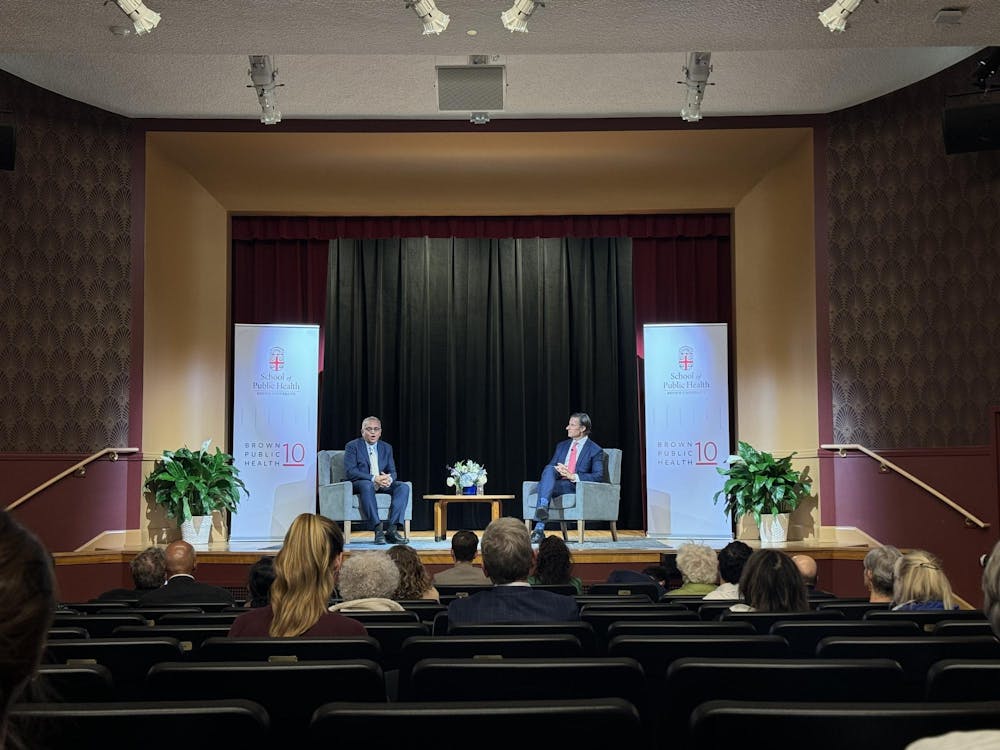Michael VanRooyen, director of the Harvard Humanitarian Initiative, discussed humanitarian efforts and global crises at the 25th Barnes Lecture hosted by the School of Public Health.
SPH Dean Ashish Jha, who moderated the event, started the conversation by asking VanRooyen a bit about his background. “I became interested in medicine because my mom suffered from cancer,” VanRooyen said. “I spent a lot of time in the hospital.”
VanRooyen said he was drawn to population vulnerability — factors that make certain groups or communities at a higher risk for poor social or physical health. He was interested in working in war and conflict and navigated his journey without much guidance from mentors.
“I had a humanitarian position in Somalia, and I had no idea what I was doing,” he said. “I realized the humanitarian community, all the doctors and nurses, all wanted to do the right thing, and yet they failed.”
VanRooyen attributed this to the lack of training many health professionals have when it comes to working in other countries. With this in mind, he mentioned his goals of building a humanitarian university: one in which students “can learn, professionalize and contextualize” the field of humanitarian aid.
VanRooyen and Jha also talked about Israel’s bombardment of Gaza. “Gaza is not a medical or public health issue,” Vanrooyen said. “It’s an access issue — causing mass-scale malnutrition, death, and a lack of medical services.”
The Integrated Food-Security Phase Classification, an assessment used by the United Nations, estimated that 1.1 million Palestinians in Gaza were experiencing “catastrophic” shortages of food in mid-March.
Jha and VanRooyen also discussed how humanitarian aid “works as a band-aid,” and how it can work to save lives through food aid or cash assistance. But “it is not the remedy” to ongoing crises, VanRooyen said, as the “remedy” is a diplomatic solution. He emphasized the need for policymakers and the government to make an impact in health.
“Public health is the intersection between the sciences and politics,” said Jha. “At some point, we need to actually be an advocate for political solutions to be effective.”
Jha also talked about the impact of American media on humanitarian efforts and public attention to these issues. As American media “grows tired of stories,” such as Ukraine, and while people in the U.S. will stop talking about these conflicts, the people in these countries will still be struggling, he said.
In the future, VanRooyen hopes for improved localization in humanitarian efforts. He also hoped to make non-government organizations’ work more effective with the countries they operate in.
When asked what advice he would give to students interested in the field of humanitarian aid, he said that this is a “phenomenally interesting field” and students are “witnessing history in a privileged position.”
“If you are interested in the field, talk to us, and go at it,” he said.
Katherine Dowling GS, a fifth year MPH student in health services, said she came to the event because “she was interested in humanitarian work in public health.”
“I learned about the importance of professionalizing the field of humanitarian aid and how it has changed over the years,” she said. “It’s cool to hear from someone who does such well-respected work in their field.”
Some shared criticism of the conversation.
Mick Chivers ’24 said that while he greatly respected VanRooyen’s work, he was disappointed in how Jha “had spoken out publicly and failed to take a stronger position with regards to the Israeli assault on Gaza.”
“Dean Jha has shared his focus on our core mission of bringing evidence and science to the public health challenges facing people in Gaza and around the world,” Spokesperson Rob Hancock wrote in an email to The Herald. “Through the Barnes lecture, as well as our upcoming Public Health Crisis in Gaza programming on April 26 and May 3, we are committed to creating spaces for robust conversation and dialogue on these issues to help define a path forward.”

Claire Song is a university news and science & research editor for The Herald. She is a sophomore from California studying Applied Math-Biology. She likes to drink boba in her free time.





